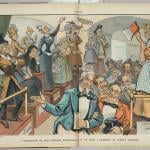Daniel Barber ( Modern Theology ) notes that “particularity cannot be reduced to universality. Therefore we have a philosophical reason for approaching Jesus through particularity: sufficient reason, when conceived as universality, is insufficient; causal frameworks cannot negotiate sufficiently with elements of chance and contingency; ‘universality’ cannot be thought of as universal in the first place. The only sufficient reason, we content, is contingent reason.” Universality cannot account for the “more” of particular contingent realities; it cannot be surprised. Read more















